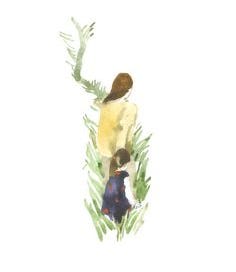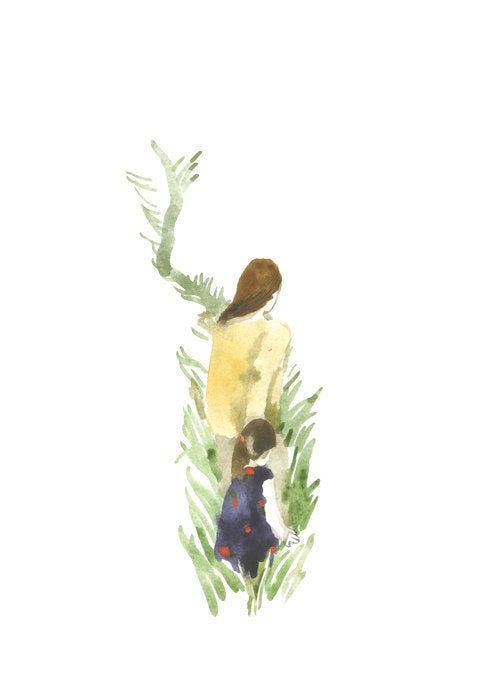Coming Home to Myself - Chapter 1
caught in-between the daughter I was and the woman I'd become
This post is an excerpt from a coming-of-age memoir-fiction in progress.
That initial stab of pain, sharp and insistent, caught me off guard like the sudden recognition of a childhood haunt. My fingers scrabbled at the worn-out edge of the examination table as the endoscope plunged in and rampaged inside my body like a bull’s horn.
"It's okay, ah, it's okay." I murmured through gritted teeth—a mantra, reliably as ever, for the girl I was ten years ago in this same hometown hospital, and for the woman I'd become in lands far from here.
A young nurse sat nearby, her eyes fixed on the computer screen where my insides were laid bare in stark black and white. "Try to relax,” she said, her voice carrying the lilting tones of a familiar dialect I never learned to speak fluently. "The more tense you are, the more it hurts. Take deep breaths."
My eyes darted to her hand, steady and sure on the keyboard. Before I could think, my arm had reached out, fingers intertwining with hers like a drowning person grasping at a lifeline. She looked at me, surprise flickering across her face before it settled back into professional composure.
"Don't move, okay?" the nurse cautioned, gently extricating her hand from mine. "Dr. Su is examining you now. She's very experienced". Her fingers, cool and impersonal, brushed against my side. I suppressed a shiver, not from cold, but from the strange intimacy of it all.
Suddenly, the thought of others intruded—countless others. Not in some grand, philosophical way, but in the most flesh-and-bone manner that viscerally resonated. I imagined people in hospital rooms across the city, across the country, even: Some in prolonged battles against their aches that had become unwelcome companions, others facing down their final moment with whatever momentary strength they could muster.
What went through their minds, I wondered, in those long hours when the clock seems frozen and the night stretches on? Did they find themselves reaching out, almost unconsciously, for someone who wasn't there? A mother long gone, perhaps, or a lover estranged? I thought of hands then - weathered ones, soft ones, ones bearing the marks of work or illness. How interesting that in moments of weakness, we might all be reduced to children again, wanting nothing more than to have our hand held.
It wasn't a comfort exactly, this connection I felt. More like a sudden awareness of a world beyond my own discomfort, a world filled with ordinary people who, like me, might be surprised by their own vulnerability in the face of it all.
Dr. Su's voice cut through the haze. "Look here," she pinpointed for others in the room, "They are indeed growing. They aren’t big, though. Nothing to worry about, my dear. We’ll schedule you for surgery tomorrow. " Her tone carried a peculiar mix of clinical precision and homegrown warmth, like a judge delivering a lenient sentence.
Relief washed over me, but it was quickly followed by a startling realization: this cellular rebellion within me? It was me. The me from years ago, packing my bags and leaving Jinan behind without a backward glance. The me who decided that the path laid out here wasn't the one I wanted. And now, drawn back by my body's protest, I found myself where it all began—yet ironically, already planning my next move.
"How old are you, dear?" Dr. Su asked as she maneuvered the probe inside me.
"Ouch... twenty...twenty five..." The words escaped me in stutters as if embarrassed by themselves.
"Such a big guī nü,” a nurse teased, with the old-fashioned endearment exclusive to those who grew up in northern China—guī nü (闺女), meaning 'innocent, young woman'.
"Indeed. I thought she was barely eighteen, carrying on like this.." Dr. Su agreed, laughing along.
Their chuckle wrapped me around with an unexpected comfort like the well-worn cotton quilt my grandmother stitched many winters ago. I made a face.
Soon as I stepped out, I discovered my mother had been a silent sentinel outside the door. Her eyes, wide with concern, searched my face. "Was it very painful?" she asked, her voice tight with worry.
"Mm, just a bit," I stated matter-of-factly, arms crossing my chest like a shield.
"How long did it hurt? Is it still hurting? Did the doctor damage something inside you?" The rapid-fire questions tumbled out, each one laden with pressing anxiety.
"Not at all. It was very brief."
"I heard you cry out from outside, and it worried me so much..." Her eyes suddenly brimmed with tears.
I couldn’t help but pull her into an embrace. She felt small in my arms, her shoulder just reaching my chest.
"Look at you," I said awkwardly, patting her back, "worrying over nothing."
I shared the nurse's surprised reaction to my actual age. Mother laughed through her tears, saying, "That's because they don't know we have always treated you like you're fifteen." She paused, then added, "Even your grandmother, who's over eighty, still fears injections. She cries like a child every time."
The image struck me then: my elderly grandmother, her skin like tissue paper left for too long in the sun, curled into herself, more fragile than the child she once was, her daughter—my mother—becoming a mother to her own mother.
Perhaps we never truly outgrow our vulnerabilities, I thought. We just learn to hide them better until we can’t anymore.
Mother reached into her bag, pulling out a chocolate bar. "Do you want some?"
I nodded, but as I reached for it, she pulled back. "Don't move, your hands are dirty. I'll feed you."
She carefully tore open the packaging along the serrated edge, squeezed out the first piece, and brought it to my lips. I frowned, dodging my head slightly. "I can eat by myself," I insisted, despite her dismissal, "I won't touch it with my hands."
The chocolate melted on my tongue, its sweetness suddenly at odds with the acrid smell wafting from the nearby toilet. At that moment, I saw the candy's journey - silky smooth as it slid down my throat, only to dissolve into a formless mush in my stomach. Unbidden, an image flashed through my mind: Kobayashi Eitaku's 19th-century scroll, "Nine Stages of Decay." It depicted the decomposing corpse of the beautiful Empress Danrin, her body abandoned in the wilderness per her final edict—a stark lesson in impermanence for her beloved countrymen to learn.
I imagined passersby confronting the Empress’s body. Once coveted by courtiers, her flesh swelled and purpled, decayed and liquefied. In my mind's eye, insects and beasts tore at her with the same fervor her admirers once gazed upon her face, her bones scattered like discarded love letters, until even dust forgot her name. The visceral imagery clung to me, as sticky as the chocolate on my teeth.
An elderly lady shuffled past in the corridor. Her gaze lingered on me before shifting to my mother. "Your little girl is quite pretty," she remarked with a friendly smile, then gestured towards her own mouth. "Oh, what's that she's eating?"
"Come here," Mother murmured, leaning in. "Let me wipe your mouth."
I jerked away, "It's fine, I can wipe it myself."
"Let me do it," Mother insisted, her hand hovering. "You don't know how to clean after yourself. There's still some, look, here."
"Ma, I said I'll do it myself!" The words burst out.
Mother's hand froze, her head tilted, brows knotting together. She turned and walked away, anger and frustration etched in the stiffness of her shoulders.
In that moment, as in countless others, I felt the ever-growing force of her near-obsessive need to shape me—as maternal as it was desperate. And beneath that surged a tide so strong that it threatened to sweep both of us away.
How could I explain to my mother that I had already been shaped, for better or worse, by forces beyond her womb and her home, by experiences she could never have imagined for me? That I had been carved by rivers she had never waded? That I had been kissed by words in languages she hadn’t learned? That strangers had left lasting marks on my soul in manners the tight grip of her tending hands could not? That I’d discovered and lost treasures she didn’t even know existed?
How could I make her see that the fifteen-year-old daughter she had in mind was only the phantom of a version of her own past?
I drifted to the elevator, my gaze drawn to the window. Late summer rain had been falling incessantly, its rhythm an inconsistent percussion against the glass. Rumors of an impending typhoon hung in the air, as lingering as the humidity that clung to my skin. The damp chill, though a respite from midsummer's swelter, brought no vigor—only a pervasive stickiness that seemed to seep into my very bones. I really do dislike rainy days, I mused.
As if plucking the thought from my mind, mother pulled away, composing herself. "When you go to Seattle for graduate school this fall," she intoned, her voice low and portentous, like a fortune-teller divining an ominous future, "It'll be weather like this every day."
She was right. If recovery went well, in a month or so, I'd be in America again for my second degree. The rain in Seattle would be different, though. The rain there would be a constant companion, a lingering mist rather than the thunderous downpour in Jinan.
I envisioned that faceless city across the vast Pacific, waiting to enfold me in the waning days of 2019. Would my hard-earned savings in the past two years and the school’s benevolent fellowship prove wiser investments this time around, with valued credentials like “Engineering” and “MSc” stamped on my degree instead of the scarlet letters of the Arts?
Would I rightfully earn my spot somewhere in the gleaming towers of tech giants, arduously scribbling my story in bits and pixels? Or would I, like the omnipresent rain, slowly dissolve into something vague, something indistinguishable from the evergreen blur of the Pacific Northwest?
How strange, I thought, to grieve for a future that hadn't yet betrayed me.
"You'll be in a lot of pain after the surgery tomorrow," Mother’s litany of forebodings brought me back to reality, her anxiety weighing in on my shoulders like a familiar blanket. "You won't be able to do anything for days," she emphasized.
"You've got to be careful on rainy days." Father's voice joined as he lowered himself into a chair. He fished out his old Huawei, the screen flickering to life with a video compilation of electric shock accidents on rain-slicked streets: Perfectly healthy people, their lives snuffed out by a simple touch of an electric pole, collapsing into puddles like marionettes with cut strings. Dad peered through his reading glasses, head tilted back, fingers fumbling with the digital screen.
"Your Baba really looks like an old man now," Mother remarked, her tone that of a slightly disgruntled policewoman who caught Time itself in some petty crime.




